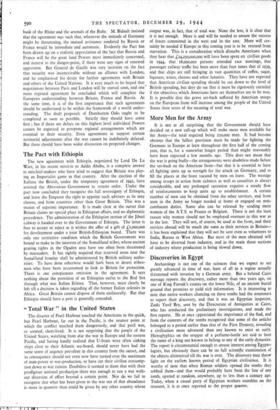Discoveries in Egypt
Archaeology is not one of the sciences that we expect to see greatly advanced in time of war, least of all in 'a region actually threatened with invasion by a German army. But a belated Cairo message reports the discovery, rather more than two years ago, on one of King Farouk's estates on the lower Nile, of an ancient burial ground that promises to yield rich information. It is interesting to note that native workers chancing on these tombs had the astuteness to report their discovery, and that it was an Egyptian inspector, Zaaki Yusif Bey, sent by the Directorate of Antiquities at Cairo, who has conducted the preliminary investigations, and made the first reports. He at once appreciated the importance of the find, and from the contents of the tombs recognised that some of the articles belonged to a period earlier than that of the First Dynasty, revealing a civilisation more advanced than any known to exist so early. Hieroglyphics on the stopper of a perfume-bottle are said to bear the name of a king not known to belong to any of the early dynasties. The report is circumstantial enough to arouse interest among Egypto- logists, but obviously there can be no full scientific examination of the objects disinterred till duc war is over. The discovery may throw light on the earliest known period -of Egyptian civilisation. It is worthy of note that when Roman soldiers opened the tombs they robbed them—and that would probably have been the fate of any tomb, opened at /random, anywhere, up to less than a century ago. Today, when a casual party of Egyptian workers stumbles on the treasure, it is at once reported to the proper quarter.


























 Previous page
Previous page